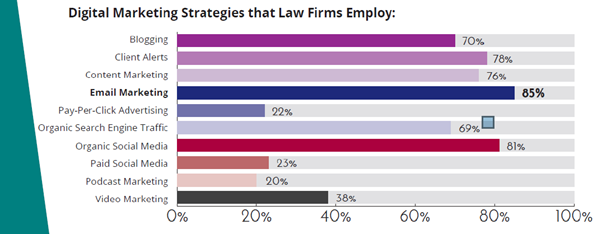There are so many marketing channels that it can get a little confusing, especially if your expertise is not in advertising. When you are getting started with promoting your law firm you will be confronted with numerous strategies that you can employ to try and attract new clients, such as digital marketing, print marketing, SEO, blogs, or even old-fashioned billboard advertisements. However, there are two crucial elements that you have to consider as you develop your law firm’s marketing plan so you do not waste your time, your energy and – most importantly – your budget. The first point to remember is that you must always market for your customers and potential clients, and the second point is that you need to create a clear and concise plan which is tailored to your business.
Should I Just Do What the Other Law Firms Are Doing?
Unequivocally, this would be a no. Like your customers, no two law firms are the same. Every law firm will be at a different point in their law marketing journey, so ensure that you plan for your firm and that you do not simply copy other law firms who may have different goals to you.
When marketing a law firm, you should make sure to consider:
- Practice area
- Size of the law firm
- Company goals
- Client acquisition targets
- Types of marketing activities that the firm is currently engaged in
- How much time the firm has to invest into their marketing
To put this into an example, if your organisation is a brand new personal injury law firm, you will be at a different stage of your marketing journey compared to an established local family law firm. A well-known legal practice specialising in family law will likely already have a strong referral network, a website and a current marketing strategy that includes a social media presence and maybe a blog, but a new firm operating in a different market may not have a website or social media channels and is unlikely to have cemented a reputation yet. Planning where to spend the legal marketing budget for each of these firms will require a different and tailored approach, potentially using different channels.
There will also be different costs that will need to be considered depending on the practice area. Using the example above, personal injury law is traditionally more expensive and requires a much higher CPL (cost per lead) whether you are marketing online or offline. Family law is renowned for being a much lower cost area of law marketing, thus requiring less spend.
[ymal]
What Marketing Channels Are There?
Right now there is, frankly, a huge amount of marketing channels available to law firms – some would say a daunting number for your consideration. Below are a few of the key channels that you should at least be considering as you map out your legal marketing strategy.
Online
- Website development
- Content marketing/blogging
- Pay-per-click advertising
- Online Reviews and referrals
- Video marketing
- Podcasts
Offline
- TV advertising
- Radio advertising
- Branding
- Print advertising
- Billboard advertising
- Referrals
Where Are Other Law Firms Marketing?
A recent study showed that, for a lot of law firms, email was the most-employed marketing channel, followed by organic social media (in contrast with paid social media advertising, which was much lower). Below you can see the full breakdown of where law firms are allocating their budget.

While the above may help to provide suggestions and give an insight into what others are doing, it remains vital that your law firm forge its own marketing path dependent on your goals. It should be added that the above chart may also be a little confusing in terms of what the difference is between organic and paid social media, for example. Legal marketing and its numerous channels can seem overwhelming, too. Marketing, much like the law, has a raft of its own terms and abbreviations which can be confusing. But do not be alarmed; a lot of them might not even be applicable to you at this time.
So Where Should I Market my Law Firm?
In simple terms, you need to market your law firm where your customers are.
When it comes to looking for a lawyer, consumers indicated that the following methods were what led them to selecting their law firm:
- Referrals from friends/family - 62%
- Online search - 37%
- Referrals from other lawyers - 31%
- Directory listings - 28%
- TV ads - 13%
- Online ads - 13%
- Radio ads - 7%
- Billboard ads - 6%
Looking at the above, it may be tempting to think that you can just sit back and rely on referrals, but this would be unwise. Why? Because these days, everything is connected. The majority of people who receive a referral from a friend or family will at the very least check that business online. If you have a multi-faceted approach, you will be more likely to bring in more traffic, more engagement and more leads. This does not mean that you have to spend money on every form of marketing – what it means is that you should prioritise your goals and match them to your customer intent.
A recent study showed that, for a lot of law firms, email was the most-employed marketing channel.
How Can I Reach My Potential Clients?
In order to match your goals to your customers, you will have to ensure you are marketing in the right place. Below are a few top tips to help you decide which avenues are best to spend your legal marketing budget.
Website
First and foremost, if you are not online then we would strongly recommend getting a website. As mentioned, more and more clients are finding law firms through search engines – in fact, a combined 78% of consumers look for lawyers online. If you are not there, put simply, you will not be found. This is why you should make sure you have a good website. It should be clear, impactful and – most importantly – include all of the pertinent information that your clients will want to see.
SEO
With the rise of search engines, SEO (or search engine optimisation) has become more and more important. Simply put, SEO is the practice of improving web content to get it show as high up the search results pages (or SERPs) as possible. Once you have a good, working website, your next step would be to focus on some level of SEO so that your website is appearing as a result of what your customers are searching.
Content Marketing/Blogging
This is the next step in the website journey. If you add a blog to your website, you can begin to tap into your law firm’s wealth of knowledge to provide answers to client questions and place yourself in front of them as a source of authority, allowing you to build trust and showcase your law firm. One word of caution is to only use a blog if you have the time to write blogs. Nothing is quite so off-putting as heading to a website’s blog page only to find that it was last updated in 2017.
In order to match your goals to your customers, you will have to ensure you are marketing in the right place.
Pay-Per-Click Advertising (PPC)
Internet traffic arriving to websites from PPC delivers 50% more leads than organic traffic, so this is an area that is not to be ignored. Unfortunately for a lot of legal practice areas, it also happens to be quite expensive! But do not be discouraged. PPC can be an excellent form of both exposure and customer acquisition.
Think Local No Matter How Big Your Law Firm
Because the world is so connected these days, the temptation is to ‘go global’ straight away, but you may end up reaching consumers who are halfway around the world when your firm is not international. So, think local; some of the best campaigns can be the most locally targeted, whether that be a billboard or an advert on local radio. If you are looking to target potential clients in your area, then make sure you allocate some of your budget on local advertising. Do not forget that you can also target locally on global platforms, create a Google Business page and encourage clients to positively review your law firm. Facebook advertising can be targeted to within a mile of your office, and you can even write blogs specifically using topics and keywords that you know will be popular with local audiences.
Use Social Media (The Right Way)
Social media can be an excellent tool for your law firm, but it can also be time-consuming and confusing. A solid social media strategy that is tailored to your audience is therefore highly recommended – but getting your law firm an account on every social media channel and paying Instagram influencers and a full-time TikTok content creator when your potential clients aren’t on Instagram or TikTok is not. You might also benefit from including some paid social media adverts to increase client awareness of your law firm, but make sure you target them and do not just put adverts live without any consideration.
Some of the best campaigns can be the most locally targeted, whether that be a billboard or an advert on local radio.
Do Not Be Afraid to Use Old-School Marketing
In today’s digital age, the temptation to abandon traditional advertising options Is all too real. But for many law firms, some of the more established marketing channels are that for a reason: because they work. If your firm is new and looking for local clients, consider an advert in your local newspaper. If you are working for an international law firm opening a new office in New York, reach out to a PR firm to help get your news out there.
Get Creative with Your Legal Marketing
Almost all the advice these days is to follow a certain checklist of steps, but with an increase in channels (and enough time) you can afford to be a little more creative. Sponsoring a charity event or sports team, creating a YouTube channel for your firm or even creating your own legal podcast are now all viable ways to reach your marketing goals.
In short, there is no right or wrong way to spend your legal marketing budget as long as you create a strategy designed with your goals and your customers in mind. If you are still unsure about the best way forward, it is worth speaking to a legal marketing company who will be able to help you plan and execute a targeted legal marketing strategy.








